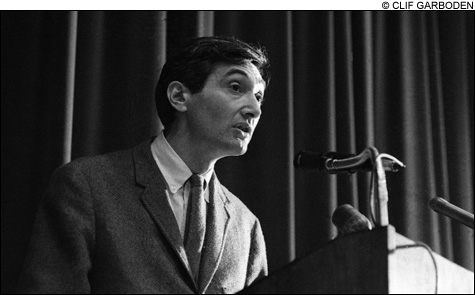
RAISING HELL: Howard Zinn (seen here in 1967) perfectly embodied the radical professor who challenged his students to think outside the establishment. |
Howard Zinn was like a daddy to Boston University students of the Vietnam War era — the students who protested and resisted the war, that is. He arrived on campus in 1964, when I was a sophomore, and within two years was the most publicly outspoken and visible member of the faculty, much to the consternation of conservative administrators. The mere mention of his name could send BU presidents into apoplexy. But they couldn't drive him out or shut him up.The author of A People's History of the United States, which has sold two million copies, has been revered by generations of students, reviled by more conventional academics, and, mostly, re-read. His literary career started modestly with SNCC: The New Abolitionists, about the Student Nonviolent Coordinating Committee, of which he was a founding member in the years when white people were included. As a professor at tiny Spelman College in Atlanta in the late '50s and early '60s, he thoroughly integrated himself with black students — ultimately, his uncompromising views got him canned. Then BU took him on.
Born poor in Brooklyn in 1922, Howard had a working-class perspective. He worked in the shipyards before joining the Army Air Force as a bombardier. The young man who bombed innocent civilians evolved into the pacifist professor who simply did not believe that any war was good or just. And while other teachers were terrified to go beyond signing petitions, the guy put his body on the line for his principles.
Howard actually organized a petition on behalf of us student journalists when, in 1966, the BU News student paper that I edited called for a campus ban of ROTC. The idea of kicking ROTC out of BU was utterly outrageous to many, but Howard succeeded in persuading 43 other teachers to join him in signing a faculty petition backing our demand. The Record American (Boston's moronic Hearst tabloid) called for his head, but Howard stood his ground. The anti-ROTC movement soon spread to other campus newspapers, resulting in a ban that still holds at elite Ivy League schools. We couldn't have been successful without his leading the faculty to our support. Student editors can be dismissed as youthful radicals, but middle-aged teachers willing to get fired or jailed for their beliefs have gravitas.
Despite that, however, Howard was a sweet, funny, likable, relaxed, easygoing kind of regular guy. He managed to become an important person without ever developing an inflated ago. You could sit with him in Dunkin' Donuts. I remember his gleeful, almost childlike amazement when A People's History started taking off in sales. He was shocked but delighted with the relatively big bucks coming in — he never thought he'd make any serious money publishing his tracts about the history of ordinary Americans. "All my other books send me a royalty of, like, $7.29," he said.